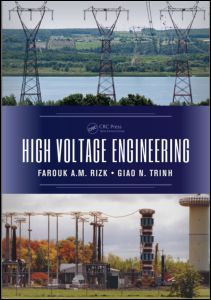Description
High Voltage Engineering
Authors: Rizk Farouk A.M., Trinh Giao N.
Language: English
Subject for High Voltage Engineering:
Keywords
IEEE Trans; Measuring; Paper Oil Insulation; Testing; Switching Impulse; Gas-Insulated Substations; Ion Space Charge; Power Transformers; Breakdown Probability; Cables; Withstand Voltage; Insulation Coordination; Equivalent Circuit; Lightning Protection; Corona Discharges; Electric Fields; High Voltage Cables; Insulators; Oil Gap; Line Conductors; Impulse Voltages; High Voltage; Insulator String; Rod Plane Gap; Excitation Function; HV Line; Return Stroke Current; Bundle Conductors; Flashover Voltage; Corona Performance; Transient Recovery Voltage; Low Voltage Arm; Rod Rod Gap; Electron Avalanche; Series Resonant Circuit; Positive Ion Space Charge
262.97 €
In Print (Delivery period: 15 days).
Add to cartPublication date: 04-2014
Support: Print on demand
95.69 €
In Print (Delivery period: 14 days).
Add to cartPublication date: 04-2017
· 17.8x25.4 cm · Paperback
Description
/li>Contents
/li>Readership
/li>Biography
/li>
Inspired by a new revival of worldwide interest in extra-high-voltage (EHV) and ultra-high-voltage (UHV) transmission, High Voltage Engineering merges the latest research with the extensive experience of the best in the field to deliver a comprehensive treatment of electrical insulation systems for the next generation of utility engineers and electric power professionals. The book offers extensive coverage of the physical basis of high-voltage engineering, from insulation stress and strength to lightning attachment and protection and beyond.
Presenting information critical to the design, selection, testing, maintenance, and operation of a myriad of high-voltage power equipment, this must-have text:
- Discusses power system overvoltages, electric field calculation, and statistical analysis of ionization and breakdown phenomena essential for proper planning and interpretation of high-voltage tests
- Considers the breakdown of gases (SF6), liquids (insulating oil), solids, and composite materials, as well as the breakdown characteristics of long air gaps
- Describes insulation systems currently used in high-voltage engineering, including air insulation and insulators in overhead power transmission lines, gas-insulated substation (GIS) and cables, oil-paper insulation in power transformers, paper-oil insulation in high-voltage cables, and polymer insulation in cables
- Examines contemporary practices in insulation coordination in association with the International Electrotechnical Commission (IEC) definition and the latest standards
- Explores high-voltage testing and measuring techniques, from generation of test voltages to digital measuring methods
With an emphasis on handling practical situations encountered in the operation of high-voltage power equipment, High Voltage Engineering provides readers with a detailed, real-world understanding of electrical insulation systems, including the various factors affecting?and the actual means of evaluating?insulation performance and their application in the establishment of technical specifications.
Insulation Stress: Power System Overvoltages.Electric Field Calculation. Statistical Analysis. Insulation Strength: Electric Breakdown of Gases. Breakdown Characteristics of Long Air Gaps. Electric Breakdown in Liquids. Electric Breakdown in Solids and Composite Materials. Applications: Overhead Lines.Lightning Protection.High-Voltage Transmission Line Insulators.Underground Cables. Power Transformers. Insulation Coordination. High-Voltage Testing and Measuring Techniques.
Farouk A.M. Rizk holds a BS and MS from Cairo University, Egypt; a Ph.D from the Royal Institute of Technology, Stockholm, Sweden; and a doctorate of technology from Chalmers University of Technology, Gothenburg, Sweden. He has worked with ASEA (ABB), Sweden; the Egyptian Electricity Authority; and the Institut de Recherche d'Hydro-Quebec, Varennes, Canada. As international chairman of IEC TC 28: Insulation Coordination, he made major contributions to standardization. An elected IEEE fellow for contributions to the science of high-voltage technology and for technical leadership in the advancement of the electric power industry, many times awarded, and a CIGRE distinguished member, he is currently president of Lightning Electrotechnologies, Inc. and Expodev, Inc., both in Montreal, Quebec, Canada. His research covers many topics in high-voltage and high-power engineering.
Giao N. Trinh holds a BS and Ph.D from Laval University, Quebec City, Quebec, Canada. He has worked with the Institut de Recherche d'Hydro-Quebec, Varennes, Canada and Ecole Polytechnique de Montreal, Quebec, Canada. He holds two patents and is the author or co-author of many technical papers in the areas of corona and partial-discharge phenomena, high voltage testing, and liquid, solid, and gaseous power equipment insulation. An elected IEEE fellow for contributions to the understanding of dielectric and arc phenomena in gas-insulated cables and PES, and a DEIS member, he received a Prize Paper Award from the Substation Committee for his work on the assessment of the risk of burn-through of gas-insulated cables.
These books may interest you

Extruded Cables for High-Voltage Direct-Current TransmissionAdvances in Research and Development 140.84 €

Power Cable Technology 220.72 €


